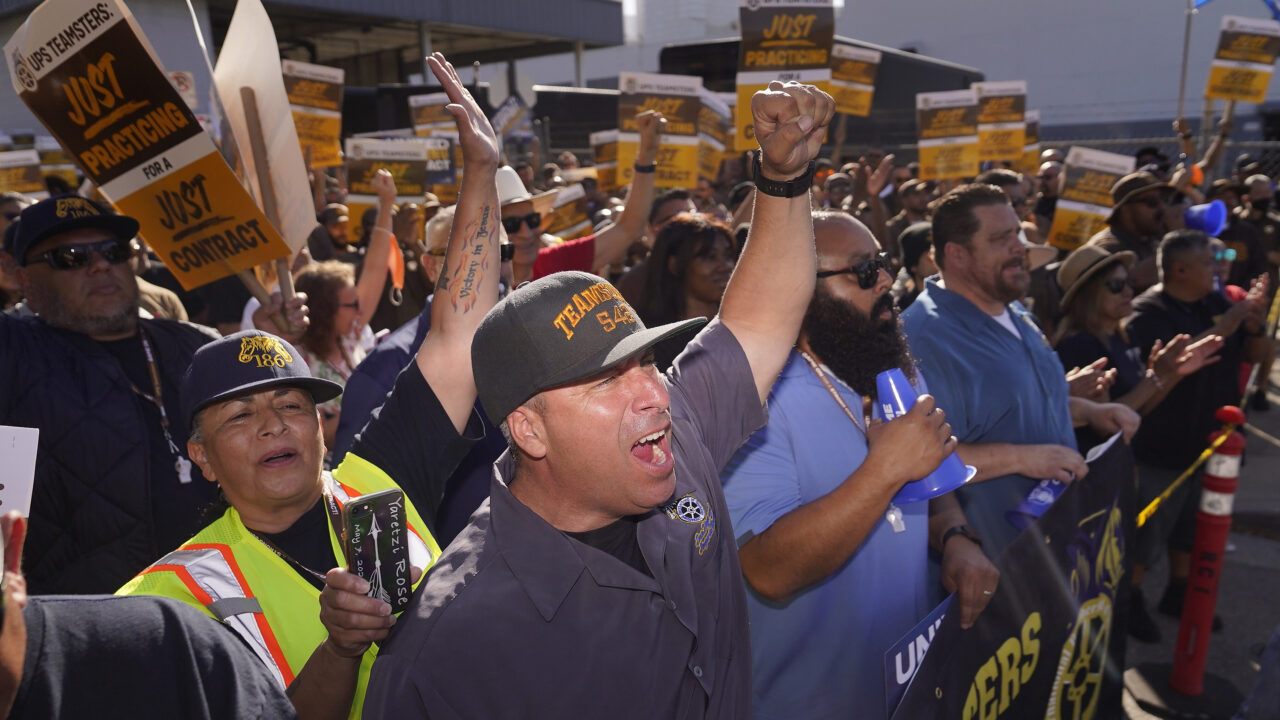Teamsters Reach Tentative ‘Historic Agreement’ With UPS
“Hot Labor Summer” just got hotter. UPS teamsters and workers hold a rally in downtown Los Angeles, Wednesday, July 19, 2023. (Photo: Damian Dovarganes/ AP)
UPS teamsters and workers hold a rally in downtown Los Angeles, Wednesday, July 19, 2023. (Photo: Damian Dovarganes/ AP)
On Tuesday, UPS and the Teamsters union, representing more than 340,000 workers at the package carrier, announced they had reached a preliminary deal to avert what would be the largest U.S. strike in 60 years.
The tentative agreement, which still needs union members’ approval, includes stronger workplace protections and salary increases for full- and part-time employees.
“We demanded the best contract in the history of UPS, and we got it,” said Teamsters General President Sean M. O’Brien. “UPS has put $30 billion in new money on the table as a direct result of these negotiations. We’ve changed the game, battling it out day and night to make sure our members won an agreement that pays strong wages, rewards their labor and doesn’t require a single concession. This contract sets a new standard in the labor movement and raises the bar for all workers.”
“This is what progressive, grass-roots union leadership is all about.”
Since negotiations with UPS started in April, the Teamsters have voted overwhelmingly to strike if their demands are not met by the expiration of their current contract on July 31.
A potential Teamster strike would have far-reaching economic implications, causing labor stoppages in industries heavily dependent on the package delivery giant and disrupting the transportation of millions of packages nationwide.
The tentative agreement has already been lauded by labor advocates. “This is a major victory for the American working class,” Sen. Bernie Sanders tweeted. “This is what progressive, grass-roots union leadership is all about.” New York Rep. Alexandria Ocasio-Cortez, who joined hundreds of Teamster members at a practice picket, has also hailed the tentative agreement on social media.
The potential deal comes amid what has been dubbed the “Hot Labor Summer,” as a number of unions threaten to strike or walk off the job. Recent months have witnessed an industry-halting strike by actors and screenwriters nationwide, as well as localized actions by hospitality workers in southern California and a Pennsylvania chapter of the United Electrical, Radio and Machine Workers of America. The summer strikes are the latest manifestation of a labor movement galvanized by the stress-test of the COVID-19 pandemic, which energized organizing nationwide and led to strikes by nurses, teachers, Uber and Lyft drivers, Trader Joe’s employees, REI workers, graduate students and retail workers.
The labor movement has also spread to major corporations such as Amazon, Apple and Starbucks, where workers are fighting for higher pay, better working conditions and the right to unionize. Although only 10% of American workers belong to a union, the public overwhelmingly supports their efforts. According to a 2022 Gallup poll, 71% of Americans support union membership, the highest rate since 1965.
“For decades now, the labor movement in this country has been on the defensive — membership has been declining, bargaining power has been falling and you’ve seen a significant decline in strikes because employers have had the upper hand,” Paul Clark, a labor and employment relations professor at Penn State University told Money. “But right now, [we’re] in the midst of a very unique situation that finds the labor movement all of a sudden on the offensive.”
Workers’ rights advocates say the Teamsters’ success in driving UPS to the bargaining table will only further embolden workers to demand higher wages, better benefits and stronger unions.
“The strike is our tactic, solidarity is our power,” said Sara Nelson, president of the flight attendants union, upon learning of the tentative UPS-Teamsters agreement. “This labor solidarity summer just got stronger.”
The Teamsters rank-and-file will begin voting on the agreement on Aug. 3.
Your support matters…Independent journalism is under threat and overshadowed by heavily funded mainstream media.
You can help level the playing field. Become a member.
Your tax-deductible contribution keeps us digging beneath the headlines to give you thought-provoking, investigative reporting and analysis that unearths what's really happening- without compromise.
Give today to support our courageous, independent journalists.
You need to be a supporter to comment.
There are currently no responses to this article.
Be the first to respond.